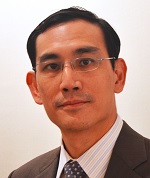 |
| A*STAR's Benjamin Seet |
Singapore, a nation working to raise its profile in the biopharma world, has kicked off the first-ever clinical trial of a locally invented drug, working with Duke University on a novel cancer treatment it hopes will spur more R&D.
The drug, ETC-159, is designed to interrupt the body's Wnt signaling pathway, which is tied to the spread of colorectal, ovarian and pancreatic cancers. Singapore's Agency for Science, Technology and Research, or A*STAR, is taking the development reins and working with Duke's local medical school to push the treatment forward.
The partners kicked off Phase I dosing last month, planning to enroll as many as 58 patients in a trial designed to determine the safety and tolerability of ETC-159. A government-funded outfit called D3, short for Drug Discovery and Development, is also on board to assist in development.
ETC-159 is of course just one drug candidate in the earliest phase of clinical study, but local leaders hope the first made-in-Singapore drug will galvanize more R&D in the country and demonstrate to global biopharma that the city-state is a sophisticated player worthy of attention and investment. Advancing the project "marks an inflection point in Singapore's biomedical sciences initiative," according to Benjamin Seet, executive director of A*STAR's Biomedical Research Council.
"Despite the protracted process of drug discovery and development, I am confident that we will see more locally developed drugs in the pipeline being tested and implemented," Seet said in a statement.
For years the Singapore government has been investing in biomedical infrastructure, angling to stand out among its regional competitors as Asia ascends in the global R&D scene. In 2006, Singapore launched the Experimental Therapeutics Center, an A*STAR operation devoted to translational research and striking public-private partnerships to encourage R&D. In the years since, the government has signed deals with CROs and drugmakers to bring world-class expertise within its borders.
- read the statement